Managing your crypto taxes doesn’t have to be confusing or stressful. In 2025, there are several practical ways for investors and creators to reduce their tax liability while staying fully compliant with IRS rules. Understanding your taxable events, tracking your crypto transactions, and applying the right strategies can help you lower your crypto tax burden without breaking any laws.
This guide breaks down step-by-step how to reduce your capital gains tax, take advantage of tax deductions, and use crypto tax software to simplify reporting. You’ll learn how to plan for long-term capital gains, offset losses, and use strategies like tax-loss harvesting, crypto donations, and self-directed IRAs to manage your tax obligations.
By following these strategies, you can ensure you only pay taxes on crypto where required, reduce your taxable income, and keep your overall tax bill under control. Whether you are actively trading, holding, or creating digital assets, this guide will help you make informed decisions to optimize your crypto tax reporting and minimize surprises at tax time.
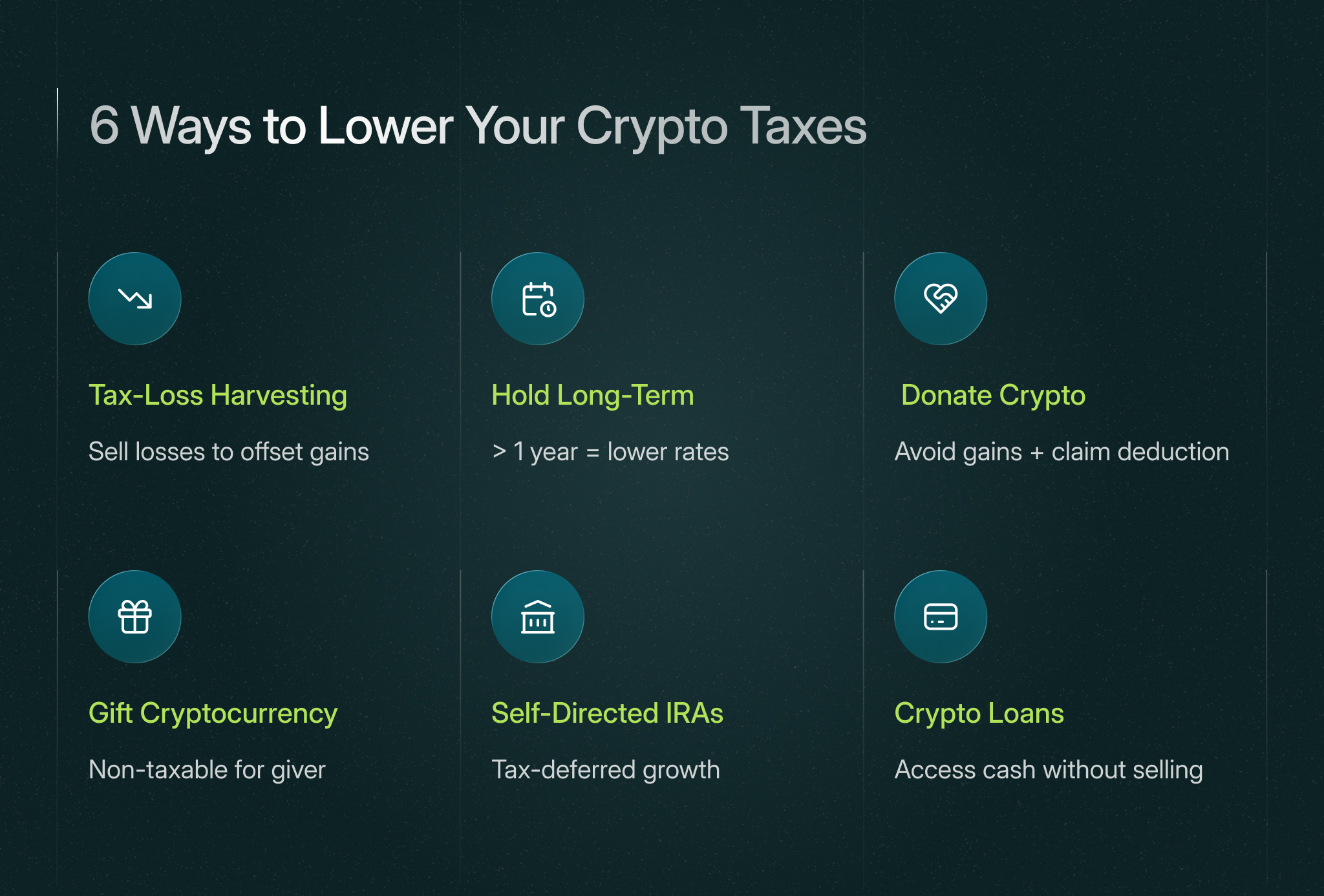
Key Strategies to Reduce Your Crypto Tax Bill
Reducing your crypto tax bill starts with understanding the rules. Here are the main strategies investors use:
-
Tax-Loss Harvesting: Selling crypto at a loss offsets gains from other assets and up to $3,000 of ordinary income. Losses beyond this can be carried forward indefinitely.
-
Holding for Long-Term Gains: Assets held over one year are eligible for long-term capital gains, which usually have lower tax rates than short-term gains.
-
Donating Crypto: Donating appreciated crypto to qualified nonprofits lets you avoid capital gains tax and claim a tax deduction based on fair market value.
-
Gifting Cryptocurrency: Gifting crypto is generally non-taxable for the giver. If the gift exceeds a threshold, a gift tax return may be required.
-
Using Self-Directed IRAs: Buying or selling crypto in a self-directed IRA can provide tax-deferral or even tax-free growth depending on the account type.
-
Taking Loans Against Crypto: Borrowing against crypto is considered a non-taxable event, allowing you to access cash without selling your assets.
Understanding Taxable Events
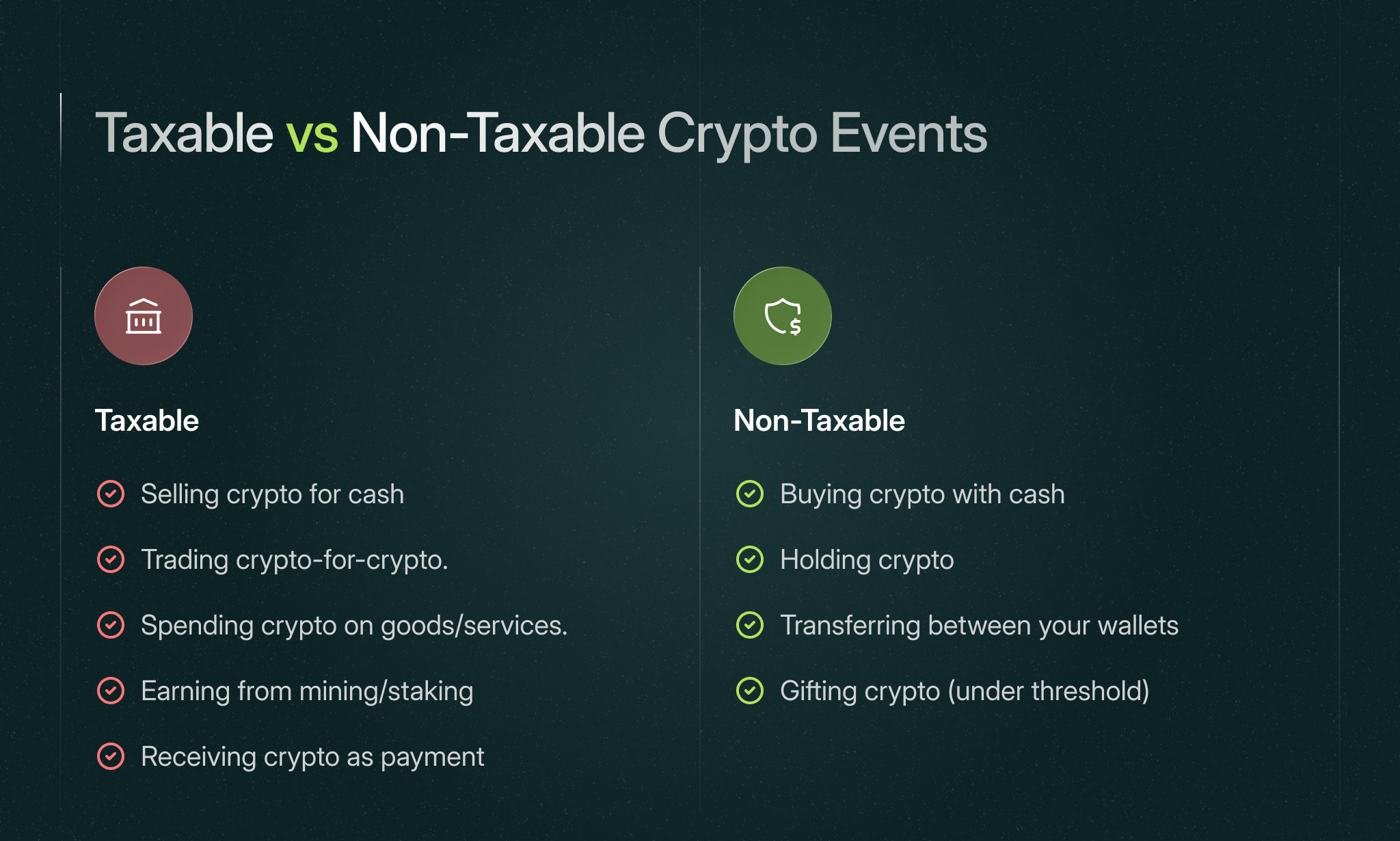
A taxable event happens whenever you sell, trade, or dispose of cryptocurrency. Knowing which actions trigger taxes is key to managing your crypto tax burden.
-
Selling crypto – When you sell cryptocurrency, you create a capital gain or loss. The gain is the difference between the sale price and your cost basis. Short-term gains (held ≤1 year) are taxed at your ordinary income tax rate, while long-term gains (held >1 year) benefit from lower long-term capital gains rates.
-
Trading one crypto for another – Exchanging one cryptocurrency for another is treated like a sale. This creates a taxable event, and you must report capital gains or losses on your tax return.
-
Purchasing goods or services – If you use crypto to buy something and it has increased in value since acquisition, the IRS treats it as a disposal, and you owe capital gains tax on the appreciation.
-
Earning crypto – Income from mining, staking, or other activities counts as ordinary income. This is taxed at your standard income tax rate and may also be subject to self-employment tax if it comes from professional activity.
-
Gifts and donations – Giving cryptocurrency as a gift is generally non-taxable, though large gifts may require a gift tax return. Donating appreciated crypto to a qualified nonprofit allows you to claim a tax deduction based on fair market value and avoid capital gains tax.
-
Tracking with crypto tax software – Managing digital asset transactions manually is complex. Using crypto tax software helps track every taxable event, calculates capital gains and losses, and prepares reports compatible with IRS forms like Form 8949 and Schedule D. Accurate crypto tax reporting ensures compliance and can reduce mistakes that might increase your tax liability.
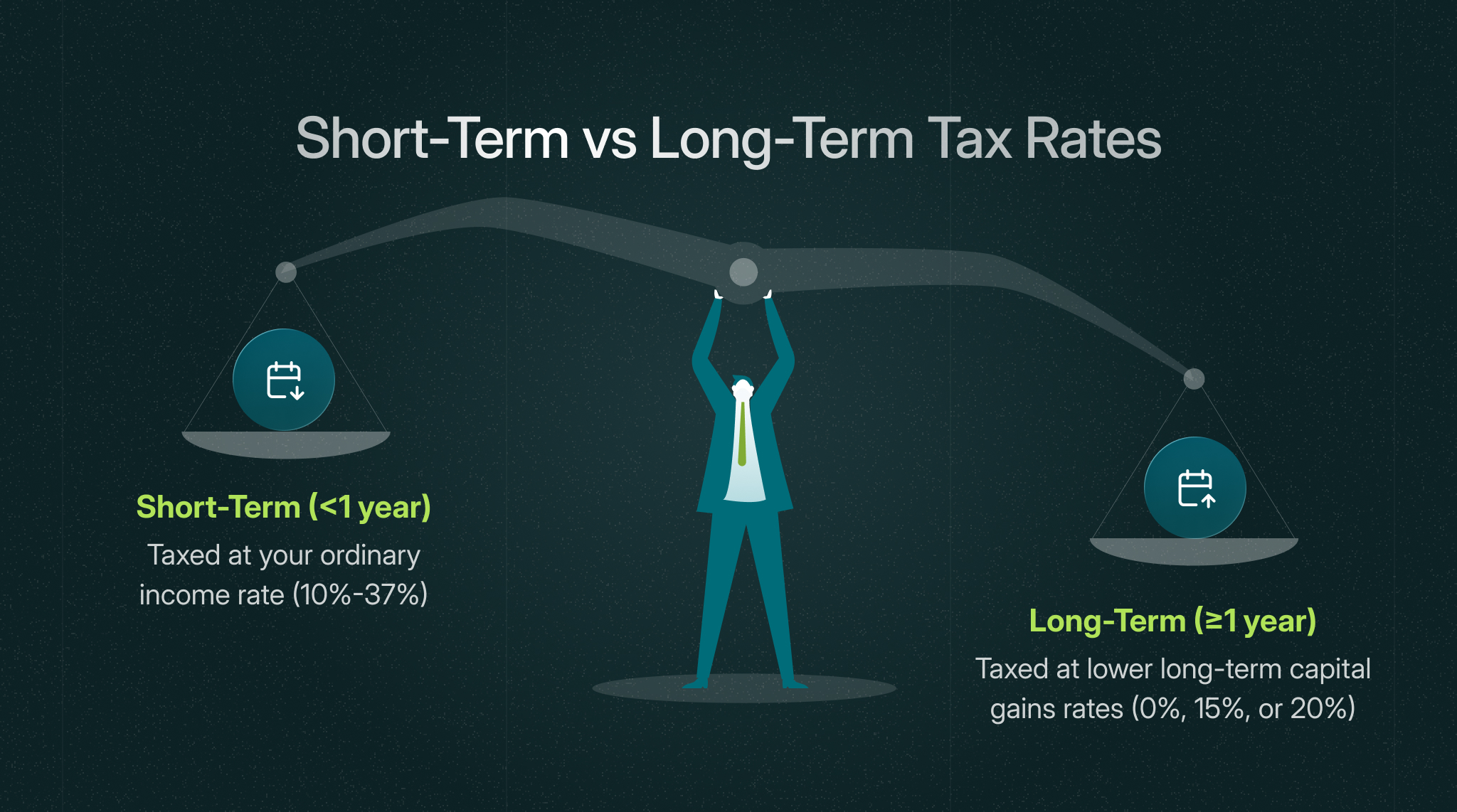
Understanding these taxable events is the first step toward lowering your crypto tax bill and planning strategies like tax-loss harvesting or holding assets for more favorable long-term capital gains rates.
Tax-Loss Harvesting Explained

Tax-loss harvesting is a strategy to reduce your crypto tax burden by turning losses into potential tax savings. Here’s how it works:
-
Identify underperforming assets – Look at your portfolio and spot cryptocurrencies that have dropped in value since purchase.
-
Sell to realize a loss – Selling these assets triggers a taxable event, but instead of paying taxes, you generate a capital loss.
-
Offset capital gains – Use the realized loss to reduce capital gains from profitable trades. This lowers the total taxable income for the year.
-
Offset ordinary income – If your losses exceed gains, you can deduct up to $3,000 per year against ordinary income.
-
Carry forward remaining losses – Any leftover losses can be carried into future tax years, creating ongoing tax benefits.
A key advantage for cryptocurrency investors is that the IRS does not apply the wash sale rule to crypto. This means you can sell a coin to claim a loss and immediately repurchase it without losing the capital gains tax benefits.
Examples of tax-loss harvesting:
-
Selling Bitcoin that has decreased in value to offset gains from Ethereum sales.
-
Selling a small portion of underperforming altcoins to reduce crypto tax liability while maintaining most of your holdings.
Using crypto tax software can simplify this process. Many platforms automatically track gains and losses, suggest tax-loss harvesting opportunities, and prepare your tax forms for accurate reporting. This ensures you stay compliant with IRS tax rules while minimizing your crypto tax bill.
Donating Crypto to Reduce Taxes

Donating cryptocurrency can lower your tax burden while supporting a cause you care about. Here’s how it works:
-
Donate appreciated crypto – You can give Bitcoin, Ethereum, or other digital assets to a qualified nonprofit.
-
Claim a tax deduction – The IRS allows a tax deduction equal to the fair market value of the crypto at the time of donation. This helps reduce your taxable income.
-
Avoid capital gains tax – If the crypto has increased in value, donating it directly lets you skip paying capital gains tax on the appreciation.
-
Applicable to various digital assets – Donations aren’t limited to Bitcoin or Ethereum; other cryptocurrencies and tokens can qualify.
-
Potential self-employment implications – If you earn crypto as part of professional activities, check if donations affect your ordinary income or self-employment tax obligations.
This strategy works best for investors holding highly appreciated assets who want to lower their crypto tax liability. It can also complement other strategies like tax-loss harvesting, helping you minimize your overall crypto tax bill.
Example:
If you bought 1 BTC for $20,000 and it’s now worth $60,000, donating it to a qualified nonprofit lets you claim a $60,000 tax deduction and avoid paying capital gains tax on the $40,000 gain.
Using crypto tax software can track your donations, calculate the fair market value, and ensure your tax forms are accurate for filing. This makes crypto tax reporting easier and helps you stay compliant with IRS tax rules.
Using Self-Directed IRAs and Loans
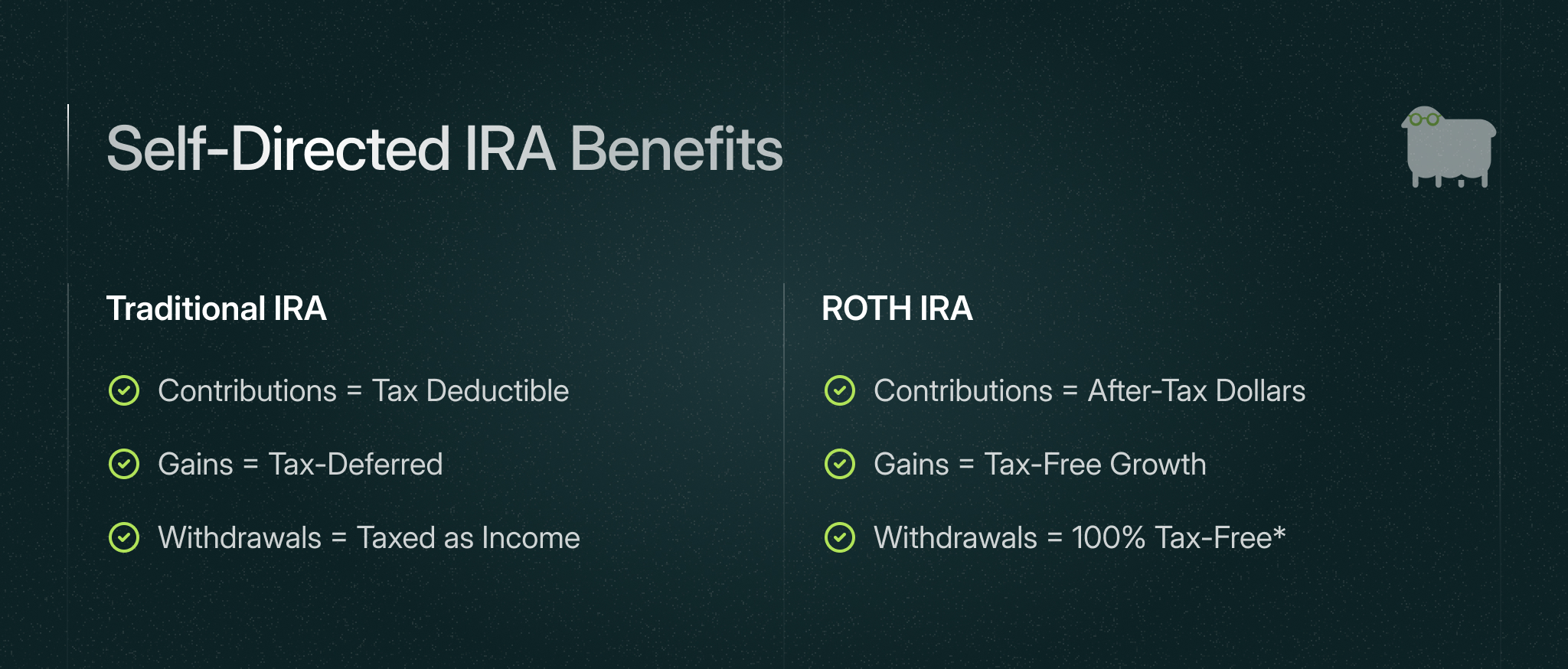

Tax-advantaged accounts and loans can help you manage crypto without increasing your tax liability.
-
Self-directed IRAs – These accounts let you buy, hold, and sell crypto inside the IRA. Gains grow tax-deferred in a traditional IRA or tax-free in a Roth IRA. You don’t owe income tax or capital gains tax until you withdraw, or possibly never in a Roth. This allows your investments to compound while keeping your taxable income lower.
-
Crypto-backed loans – Instead of selling, you can borrow against your crypto holdings. The borrowed funds are not considered a taxable event, so you can access liquidity without increasing your crypto tax burden. This can be useful if you need cash for investments, expenses, or other opportunities without triggering capital gains.
Both methods let you access or grow your crypto while legally reducing taxable gains. They work well alongside other strategies like tax-loss harvesting, long-term holding for favorable capital gains rates, or donating crypto to charities.
Example:
If you hold $100,000 worth of Bitcoin, you could take a crypto-backed loan of $50,000. You receive the cash, but you don’t owe capital gains tax because you didn’t sell. Meanwhile, your Bitcoin can continue to grow inside a self-directed IRA, delaying or eliminating income tax depending on the account type.
Using these tools alongside crypto tax software helps track your transactions and ensures your tax forms reflect these strategies accurately. This keeps your tax reporting compliant with IRS tax rules and may reduce your overall crypto tax bill.
Planning for Long-Term Gains
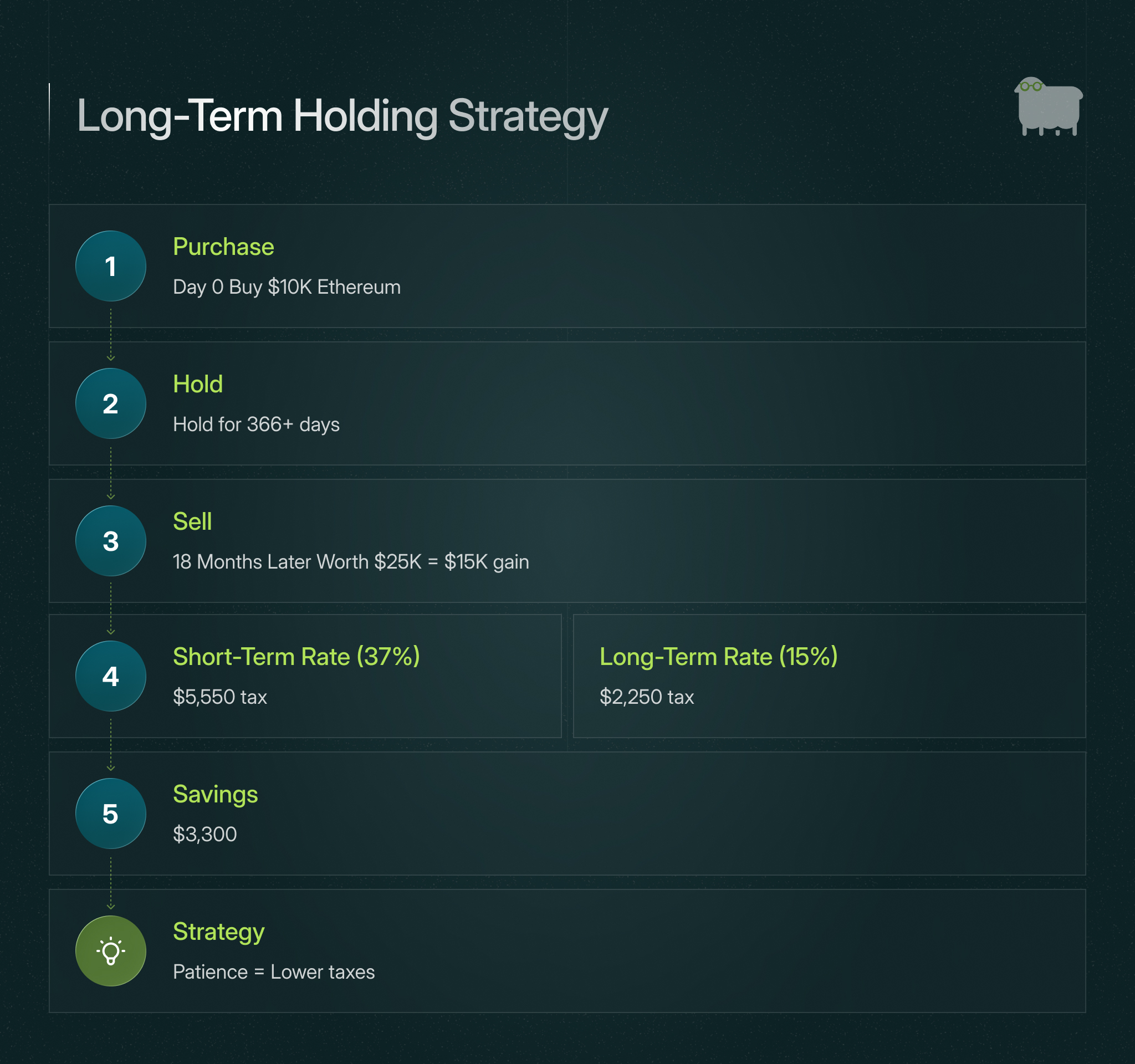
Holding crypto for the long term is one of the simplest ways to lower your tax burden.
-
Qualify for long-term capital gains rates – Assets held for over a year are taxed at long-term capital gains rates, which are usually lower than short-term rates. This can reduce the amount of capital gains tax you owe and keep your overall taxable income lower.
-
Encourages strategic investing – Long-term holding discourages frequent trading, which can create multiple taxable events. By keeping trades minimal, you reduce the risk of high ordinary income tax from short-term gains.
-
Combine with tax-loss harvesting – If you have other crypto or investments with losses, you can offset gains to further reduce your crypto tax liability. This helps manage capital gains and losses efficiently.
-
Simplifies crypto tax reporting – Holding assets long term makes your crypto tax reporting easier. You’ll have fewer transactions to track and report on IRS forms like Form 8949 and Schedule D.
-
Supports broader tax strategy – Long-term holdings can work alongside other strategies like using self-directed IRAs, donating crypto, or taking crypto-backed loans. This integrated approach can minimize your tax bill and improve your overall tax efficiency.
Example:
If you bought $10,000 in Ethereum and held it for 18 months before selling, your profit qualifies for long-term capital gains. Instead of being taxed at your ordinary income rate, you pay the long-term capital gains rate, potentially saving thousands in taxes compared to short-term trading.
Choosing the Right Crypto Tax Software
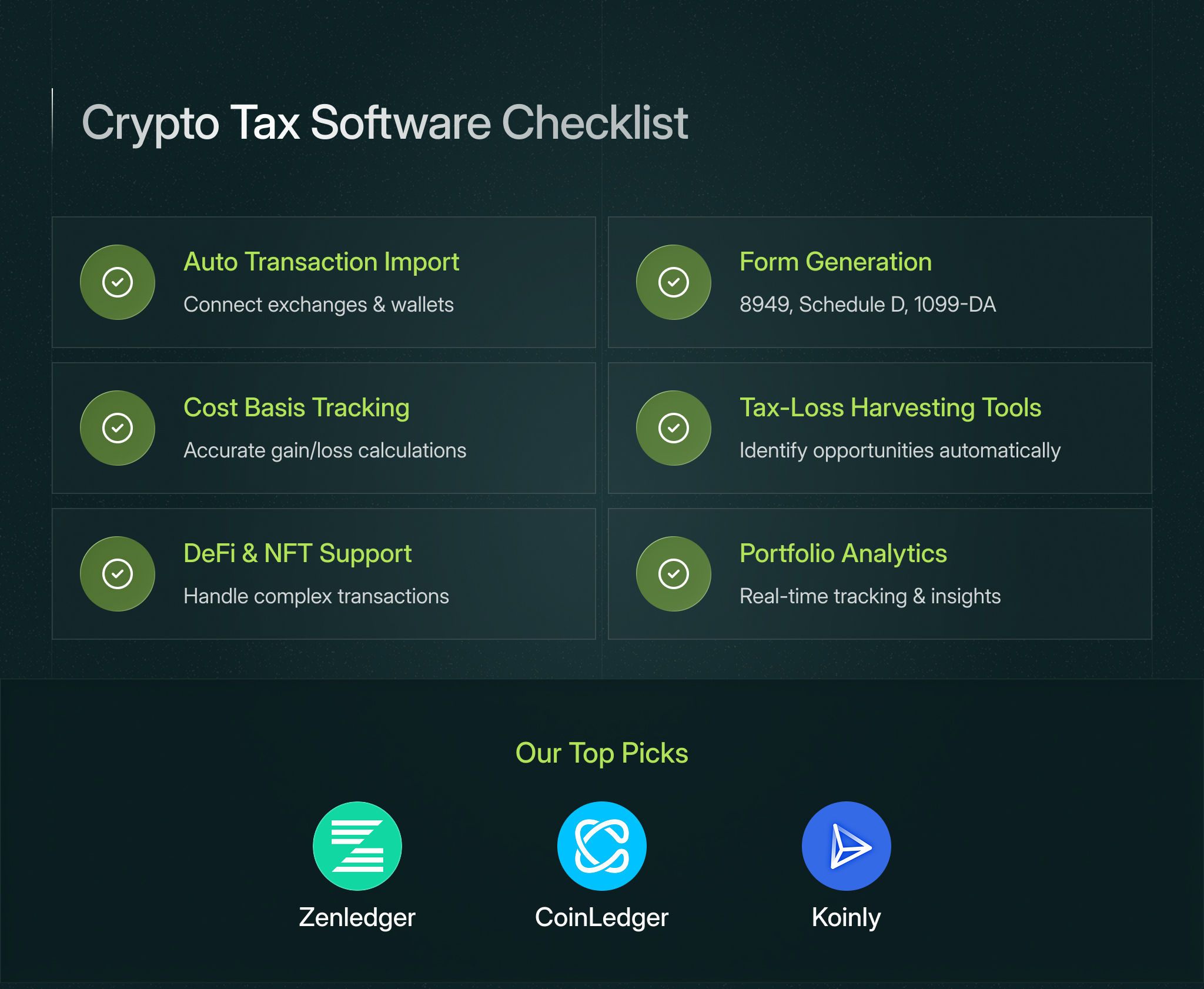
Good crypto tax software does more than just track transactions. It helps you calculate capital gains, monitor taxable events, and generate IRS-compliant tax forms. The right software simplifies crypto tax reporting and reduces mistakes on your tax return.
-
Automatic transaction imports – The best platforms can automatically import transactions from crypto exchanges and wallets. This saves time and ensures you capture every crypto transaction accurately.
-
Track cost basis and gains – Software should calculate cost basis, fair market value, and capital gains and losses. This helps you understand your taxable income and plan your tax strategy.
-
Support for complex crypto activities – Look for platforms that handle staking rewards, DeFi transactions, and NFTs. Many also support cross-chain transactions and margin trading, making them suitable for high-volume traders and institutional investors.
-
Automated tax form generation – Top platforms generate IRS forms like Form 8949, Schedule D, and even Form 1099-DA for applicable users. This ensures your crypto tax reporting is compliant with tax regulations and accepted by tax authorities.
-
Portfolio tracking and analytics – Many platforms include portfolio trackers to monitor your digital asset holdings and real-time gains or losses. This makes it easier to spot opportunities for tax-loss harvesting or manage capital gains tax strategically.
Popular options:
-
CoinLedger – Supports multiple exchanges, wallets, and high-volume transactions. Provides automated tax form generation and crypto tax reporting features.
-
Koinly – Offers support for NFTs, DeFi transactions, and integrates with major crypto exchanges. Good for international users with cross-border tax compliance.
-
ZenLedger – Handles professional-level accounting for crypto investors and institutional users, offering portfolio analytics and detailed tax reporting.
Choosing the right crypto tax software helps you save time, reduce tax liability, and stay compliant. With the right tools, you can easily manage your crypto tax obligations while focusing on your investments.
How Count On Sheep Can Help
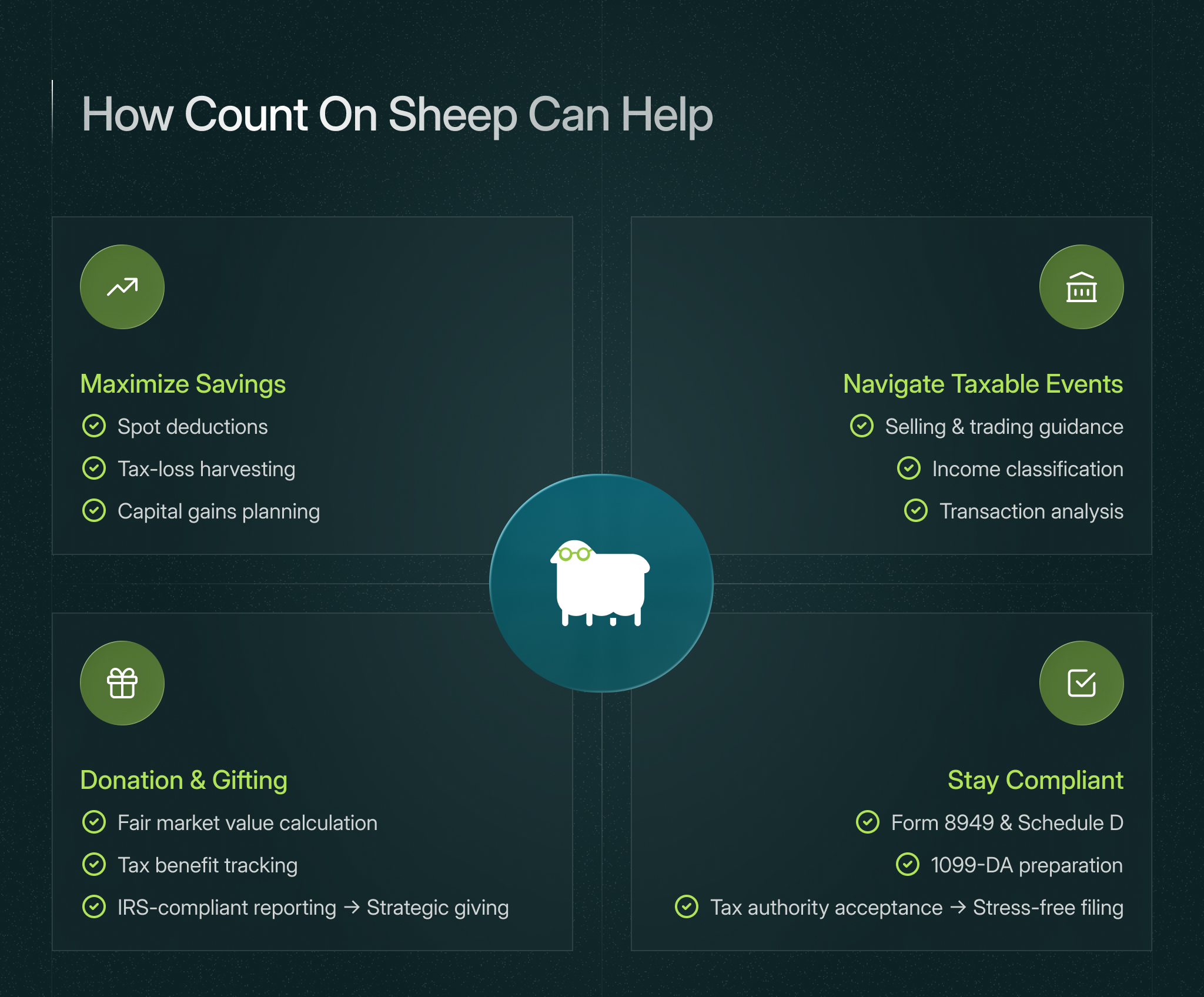
At Count On Sheep, we guide you through crypto taxes without stress. Our team combines professional CPA support with easy-to-use crypto tax software to simplify your crypto tax reporting.
-
Maximize tax savings – We help you spot deductions, use tax-loss harvesting, and plan around capital gains so your tax liability is minimized.
-
Navigate taxable events – Whether you’re selling crypto, transferring assets, or earning crypto income, we make sure you understand your taxable events and the tax implications for each transaction.
-
Donation and gifting guidance – If you donate crypto or gift digital assets, we help you calculate fair market value, track tax benefits, and ensure IRS-compliant reporting.
-
Stay compliant – From Form 8949 to Schedule D and 1099-DA, we make sure your tax forms are filled correctly and accepted by tax authorities.
With Count On Sheep, you get accurate crypto tax reporting, personalized advice, and strategies to lower your crypto tax burden—all while staying compliant and stress-free.
FAQs
1. How does tax-loss harvesting work?
Selling crypto at a loss offsets gains from other assets. Up to $3,000 can reduce ordinary income, and excess losses carry forward.
2. Are crypto donations tax-deductible?
Yes. Donating crypto to a qualified nonprofit allows you to claim a deduction for fair market value and avoid capital gains tax.
3. Do I pay taxes when I gift crypto?
Typically, gifting crypto is non-taxable for the giver. Large gifts may require a gift tax return.
4. Can I avoid taxes by taking a loan against crypto?
Yes. Borrowing is non-taxable. You only owe taxes when you sell or transfer the asset.
5. Do long-term holdings lower my tax rate?
Yes. Long-term capital gains are taxed at a lower rate than short-term gains, reducing your tax bill.
6. How do I track all crypto transactions?
Use crypto tax software to automatically import crypto exchanges and wallets transactions, calculate capital gains, and prepare IRS forms.
7. What forms do I need to file crypto taxes?
Common forms include Form 8949 for capital gains and losses and Schedule D for net gains. Self-employed creators may also use Schedule C.
Tags:
Crypto Taxes
October 22, 2025


